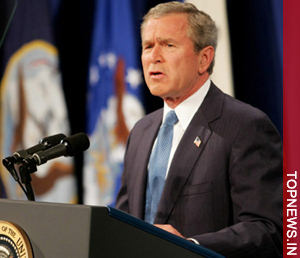Bush to bid farewell to Asian leaders at summit
 Washington - US President George W Bush will participate in his last scheduled summit this weekend, bidding farewell to a group of East Asian and Latin American nations at a gathering in Peru.
Washington - US President George W Bush will participate in his last scheduled summit this weekend, bidding farewell to a group of East Asian and Latin American nations at a gathering in Peru.
Despite Bush's unpopularity abroad, he leaves office with some successes in relationships across the Pacific, including a period of stability and maintaining the status quo in China-Taiwan relations and of building ties with Vietnam.
"One thing the Bush administration can point to that is good is pretty much stability in Asia," said Adam Segal of the Council on Foreign Relations in New York.
Bush is set to address the Asia-Pacific Economic Cooperation (APEC) summit on Saturday in Lima, Peru, the last of his planned trips abroad before he turns over the reins of office on January 20 to president-elect Barack Obama. Obama will not attend or send representatives to the summit.
APEC is made up of Asian, Latin American and North American countries along the Pacific Ocean, as well as Australia, New Zealand and other nations.
Bush's eight-year administration has not gone without challenges in the region.
In his first weeks in office, he had to manage the collision of a US spy plane and Chinese fighter jet. The Chinese pilot was killed, while the US crew was forced to make an emergency landing on China's Hainan Island.
After a 10-day standoff and an apology from the Bush administration, China allowed the crew to leave. Despite the bad start, US relations with China have since warmed.
The two countries worked together closely on the international dispute over North Korea's nuclear activities, and US officials often praised Beijing for hosting talks that eventually produced a North Korean promise to abandon atomic weapons - an agreement that has yet to be fully implemented.
The United States deftly managed the confrontation between Taiwan and China. China regards the island as a renegade province and has threatened military force if Taipei moves toward declaring independence.
"The management of the relations across the Strait was clearly a big success for this administration," Segal said. "At the beginning it looked like it could go the other way."
Unlike relatively stable relations with most of Asia, Washington's relationship deteriorated with much of Latin America, a region some analysts believed Bush neglected despite frequent trips there.
"Bush has actually made a number of visits to the region," said Michael Shifter of the Inter-American Dialogue, a think tank in Washington. "Unfortunately, those visits have not translated into a serious commitment to improving US-Latin American relations, which reached a low point under his administration."
Most of Latin America is eagerly awaiting an Obama administration, Shifter said, but with wars in Iraq and Afghanistan and an economic crisis: "I doubt the president-elect is focusing at all on the region."
One exception was Colombia, where Bush cultivated strong relations with Bogota and provided billions of dollars in aid to help the government fight FARC rebels.
At the same time, leaders like Hugo Chavez in Venezuela and Evo Morales in Bolivia gained popularity with rhetorical attacks on Washington's traditional influence in the region. (dpa)